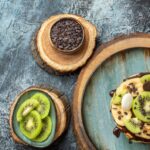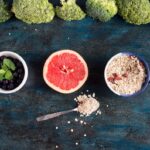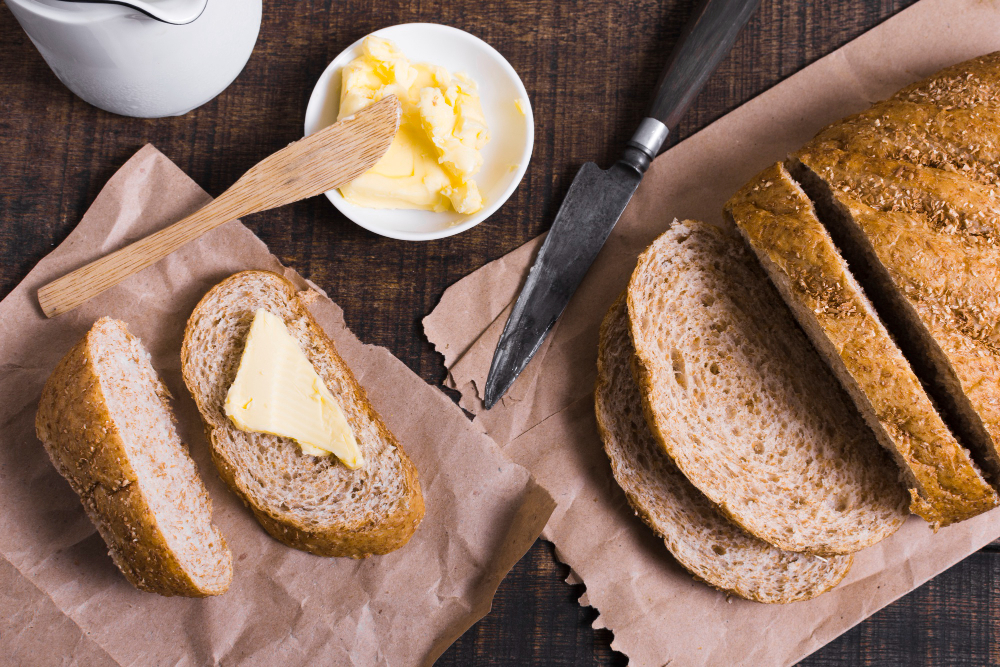This report provides a comprehensive, multi-dimensional analysis of why Non-Dairy Butter Is a Must-Have for Lactose-Intolerant Individuals. Using the lenses of nutritional science, ethical advocacy, environmental impact, practical application, and cultural observation, we explore the significance of this essential pantry swap.
Key findings confirm that non-dairy butter provides a safe, comfortable, and often nutritionally superior alternative to traditional butter, eliminating the painful symptoms of lactose intolerance while aligning with ethical and sustainable food choices. This analysis synthesizes these perspectives to highlight how this simple product drives improved quality of life and culinary inclusion.
Nutritional Crossroads
For lactose-intolerant individuals, the decision to use non-dairy butter is an immediate “Nutritional Crossroads” leading to significant symptom relief. Traditional dairy butter, though low in lactose compared to milk, still contains milk proteins and trace lactose that can trigger painful digestive symptoms (bloating, gas, diarrhea) in sensitive individuals, as their bodies lack sufficient quantities of the enzyme lactase to break down the milk sugar lactose.
Non-dairy butter, typically made from oils like coconut, palm, and various seeds, entirely bypasses this issue. This essential swap allows individuals to enjoy the sensory pleasure of butter without the negative physiological consequences, providing a vital tool for dietary comfort and safety.
LENS 1: Nutritional Analysis
The Nutritionist’s View: Safety, Comfort, and Saturated Fat Balance
The Registered Dietitian views non-dairy butter as a necessity for symptom mitigation and a strategic opportunity to manage fat quality. The fundamental nutritional benefit is the complete absence of lactose, resolving a core dietary conflict for lactose-intolerant individuals.
“The primary advice for lactose intolerance is exclusion, and non-dairy butter is the safest, most effective swap,” asserts Dr. Sarah Chen, a Registered Dietitian specializing in digestive health. “Beyond safety, we often recommend plant-based butters that prioritize unsaturated fats (like avocado or olive oil blends) over products that rely heavily on coconut oil or palm oil, which are high in saturated fats. This helps balance the individual’s overall fat profile without sacrificing functionality.”
Nutritional Deep Dive: Cholesterol and Trans-Fats
Unlike dairy butter, which contains dietary cholesterol, non-dairy butters are cholesterol-free. Furthermore, modern non-dairy butters have largely eliminated trans-fats through improved processing techniques (avoiding partial hydrogenation), making them a generally safer fat choice compared to older forms of margarine. When answering questions about non-dairy butter, the RD guides consumers to check labels for low saturated fat content and the inclusion of beneficial oils.
Common Misconceptions vs. Reality:
- Misconception: Non-dairy butter is nutritionally identical to margarine.
- Reality: Modern non-dairy butter is specifically formulated to mimic the texture and fat content of dairy butter (high fat), whereas older margarines were lower in fat and often contained trans-fats. The key difference is the fat source and formulation.
LENS 2: Ethical Framework
The Ethical Advocate’s Stance: Compassion and Ingredient Integrity
The adoption of non-dairy butter extends beyond personal health for lactose-intolerant individuals; it aligns consumption with ethical values, particularly animal welfare. For the ethical advocate, the simple swap represents a direct rejection of the dairy industry.
“Choosing non-dairy butter is a clear vote for compassion,” explains Alex Hsu, an ethical advocate. “It removes support for industrial dairy farming practices. Furthermore, the ethical lens is applied to the plant ingredients themselves: we must demand transparency regarding the sourcing of key ingredients like palm oil, ensuring it is certified RSPO (Roundtable on Sustainable Palm Oil) or, ideally, supporting brands that use palm-free formulations (e.g., coconut, olive, and shea butter blends) to mitigate habitat destruction.”
Critical Reassessment: Palm Oil Sourcing
The ethical advocate encourages a critical reassessment of the convenience often provided by non-dairy products. Consumers must actively search for certifications or ingredient statements that confirm the brand adheres to high labor and environmental standards, ensuring the ethical integrity of the final product.
LENS 3: Environmental Impact
The Environmental Scientist’s Analysis: Lower Greenhouse Gas Footprint
From an environmental perspective, non-dairy butter generally offers a significant advantage due to its lower resource requirements and greenhouse gas emissions compared to traditional dairy production.
“The environmental cost of dairy is primarily driven by the methane emissions from cows and the extensive land/water use required for feed production,” states Dr. Camila Velez, an environmental researcher.
“Plant-based oils, even when considering the land use for coconut or palm, generally result in a lower overall carbon footprint and reduced water consumption compared to the same amount of dairy butter fat. This makes the swap an environmentally conscious choice, especially when ingredients are sourced locally or sustainably.”
Market Transformation Maps: Oil Alternatives
The growing demand for non-dairy butter drives investment in more sustainable oil alternatives. For example, the market is responding with butters based on avocado oil, sunflower oil, and faba bean protein, which require less land and water than traditional dairy or certain tropical fats. This is accelerating the development of low-impact, regional ingredients.
LENS 4: Practical Application
The Everyday Practitioner’s Experience: Perfect Functionality
For the everyday practitioner managing lactose intolerance, non-dairy butter is a must-have because it offers near-perfect culinary functionality. It eliminates the need to substitute less ideal fats (like vegetable oil or short-chain margarine) in complex recipes.
“The practical genius of non-dairy butter is that it behaves like the real thing,” advises Chef Leo Chen, a food industry practitioner. “In baking, where the fat’s melting point and water content are crucial for structure, modern non-dairy sticks can be substituted 1:1 for dairy butter.
They cream with sugar properly, provide the necessary fat content for flaky pastry dough, and hold up in high-heat sautéing. It makes managing lactose intolerance in the kitchen seamless and stress-free.”
Daily Impact: No More Menu Compromise
The daily impact is enormous: a lactose-intolerant individual no longer has to skip toast, forgo buttering vegetables, or compromise the integrity of their favorite baking recipes. The product ensures culinary inclusion in everyday life.
Alternative Approaches: Making it At Home
For the hyper-sensitive or those who want total control over ingredients, an alternative approach is making it at home using solidified coconut oil, liquid olive oil, lecithin, and filtered water, providing a completely customizable, allergen-free product.
LENS 5: Cultural Significance
The Cultural Observer’s Perspective: Reclaiming the Comfort Food
Butter holds deep cultural significance as a comfort food, a staple of holiday baking, and a marker of culinary richness. For the cultural observer, non-dairy butter allows lactose-intolerant individuals to fully participate in shared culinary traditions without medical distress.
“Butter is tied to nostalgia and celebration,” observes Dr. Hannah Dubois, a sociologist of food culture. “For years, lactose-intolerant people often felt excluded or forced to make do with poor substitutes. The perfection of non-dairy butter allows them to ‘reclaim’ those cultural touchstones—the buttery taste of a holiday cookie or the simple pleasure of buttered popcorn—fully and comfortably. This drives social and culinary inclusion.”
Turning Point Analysis: The Artisan Vegan Butter Trend
A key turning point was the introduction of high-quality, artisan-style non-dairy butters (often fermented or cultured with plant-based lactic acid) that moved beyond simple functionality to replicate the complex flavor and aroma of dairy butter. This elevated the product from a necessity to a desirable culinary item.
Voice of Experience: The Joy of Simplicity
“The ability to just grab a stick of non-dairy butter and bake a simple cake without calculating drops of lactase or preparing for digestive pain is truly liberating,” shares lifestyle blogger Chris Miller. “It makes food fun again.”
PERSPECTIVE INTERSECTION MATRIX
- Nutrition (LENS 1) cap Practical Application (LENS 4): The nutritional safety (lactose-free) and beneficial fat profile (LENS 1) are delivered with the perfect functionality (1:1 baking substitute, LENS 4) that the consumer requires for daily use.
- Ethics (LENS 2) cap Environmental Impact (LENS 3): The ethical choice to reject the dairy industry (LENS 2) aligns directly with the reduced land/water usage and lower greenhouse gas emissions of most plant-based oil alternatives (LENS 3).
- Cultural Significance (LENS 5) cap Practical Application (LENS 4): The product’s high functionality (LENS 4) enables the lactose-intolerant individual to participate fully in culturally significant butter-reliant traditions (LENS 5).
- Synthesis: Non-dairy butter is a product driven by physiological necessity that, by meeting this need, simultaneously provides ethical, environmental, and cultural benefits, making it an indispensable part of modern, inclusive eating.
MISCONCEPTION ANALYSIS
| Misconception | Reality |
| “Non-dairy butter tastes artificial or heavily of coconut.” | Modern formulations use complex oil blends, emulsifiers, and often plant-based fermentation to achieve a neutral, buttery flavor and aroma. |
| “It’s just as unhealthy as high-trans-fat margarine.” | The industry has removed trans-fats and many brands now offer low-saturated fat options based on monounsaturated oils (olive, avocado). Checking the label is key. |
| “It can’t be used for high-heat cooking.” | Non-dairy butters formulated with high-heat oils like refined coconut and palm oil (or their blends) are excellent for sautéing and pan-frying. |
| “Dairy butter is naturally lactose-free.” | While traditional butter is very low in lactose, trace amounts and milk proteins can still trigger symptoms in highly sensitive or allergic individuals. |
KEY TURNING POINTS
- Removal of Trans-Fats (Mid-2000s): The industry-wide shift away from partially hydrogenated oils significantly improved the nutritional profile and public perception of non-dairy spreads.
- The Rise of Specialty Oils (2010s): The incorporation of healthy oils (olive, avocado, shea) into non-dairy formulations allowed the industry to reduce palm/coconut content while improving flavor and functionality.
- The Artisan Cultured Vegan Movement: The creation of butters cultured with plant-based lactic acid marked the shift from simple replacement to premium replication, enhancing cultural acceptance.
SYNTHESIS & RECOMMENDATIONS
Non-dairy butter is a critical tool for quality of life for the lactose-intolerant individual. It successfully navigates the complex demands of health, ethics, and culinary tradition.
Convergent Reflections: The necessity of eliminating lactose (Nutrition) drove the innovation (Practical) to create a product that is environmentally sound (Environmental) and ethically aligned (Ethical), thus normalizing and including a large segment of the population in everyday food traditions (Cultural).
Recommendations:
- Prioritize Ingredient Quality: When purchasing, check the ingredient list for RSPO certified palm oil or, preferably, choose brands that utilize healthy, low-saturated alternatives like olive, avocado, or shea butter.
- Test for Functionality: If you plan to bake, purchase a non-dairy “stick” formulation, as these are engineered to mimic the proper fat-to-water ratio for successful baking and pastry dough.
- Read the Labels: Always verify the fat content, especially saturated fat, and ensure the product is free from any secondary allergens you may have (e.g., soy lecithin or hidden nuts).
- Embrace the Freedom: Use non-dairy butter to reclaim recipes you may have abandoned, confidently participating in shared meals and culinary celebrations.
FURTHER AREAS OF EXPLORATION
- The use of plant-based fermentation and culturing techniques in replicating dairy flavors.
- Analysis of the different melting points and emulsifiers used in plant-based butters for specific culinary applications.
- The global market impact of palm-oil-free non-dairy butter alternatives.
- The benefits of using specific plant oils (e.g., avocado) in non-dairy butter for cardiovascular health.












